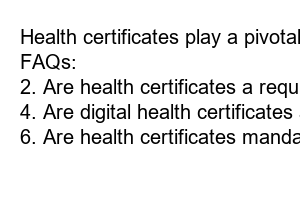보건증 발급방법
Title: Simplifying the Health Certificate Issuance Method: A Comprehensive Guide
Introduction:
Ensuring the well-being of individuals is of paramount importance, especially in the wake of a global pandemic. To facilitate the smooth functioning of travel, work, and social activities, health certificates have quickly become a necessity. In this blog post, we will explore the method of health certificate issuance, highlighting its significance and simplifying the process for our readers.
1. What is a Health Certificate?
A health certificate is an official document that verifies an individual’s health status based on specific criteria or requirements. It provides information about the person’s physical and mental well-being to support their participation in various scenarios.
2. Understanding the Health Certificate Issuance Process
The health certificate issuance process involves several steps, starting with the physical examination of the individual by a healthcare professional. The examination typically includes comprehensive tests and screenings tailored to the purpose of the certificate. Once the examination is complete, the results are documented, and the certificate is issued.
3. Health Certificate Types and Their Application
Different types of health certificates serve distinct purposes, such as travel, employment, or participation in certain events. Travel health certificates, for instance, may require vaccinations, recent test results, or a clean bill of health. Employment-related health certificates might focus on screening for communicable diseases like tuberculosis or hepatitis.
4. The Role of Technology in Health Certificate Issuance
Technology has revolutionized the health certificate issuance process, making it more efficient and reliable. Many countries have introduced digital health passport systems, allowing individuals to store their health records securely on mobile applications. These digital solutions help streamline the issuance process while ensuring the privacy and accessibility of critical health information.
5. Ensuring Authenticity and Recognition
Maintaining the authenticity of health certificates is crucial to prevent fraud and misrepresentation. Digital verification mechanisms, such as QR codes, can be incorporated into health certificates to ensure their validity. Additionally, international recognition and acceptance of health certificates help facilitate hassle-free travel and participation in global activities.
6. Addressing Privacy Concerns
Privacy concerns regarding the collection and storage of personal health information are valid. However, stringent data protection measures, including encryption protocols and secure storage frameworks, are implemented to ensure that sensitive health data remains confidential. Compliance with reputable data security standards and regulations is vital in alleviating privacy concerns.
7. Simplifying the Renewal Process
Health certificates usually hold a validity period and may require renewal for continued use. Streamlining the renewal process can save valuable time and effort for individuals. Utilizing online platforms or appointment systems tailored for health certificate renewal helps reduce the complexity of the procedure.
Summary:
Health certificates play a pivotal role in various aspects of life, including travel, employment, and event participation. Understanding the process, types, and technology involved in their issuance is crucial. By prioritizing authenticity, recognition, privacy, and streamlining the renewal process, we can ensure a seamless and secure experience for individuals requiring health certificates.
FAQs:
1. How long does it take to obtain a health certificate?
2. Are health certificates a requirement for international travel?
3. Can a health certificate be issued without a physical examination?
4. Are digital health certificates accepted universally?
5. How often should health certificates be renewed?
6. Are health certificates mandatory for all employment sectors?

